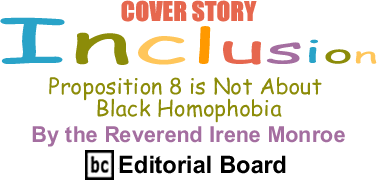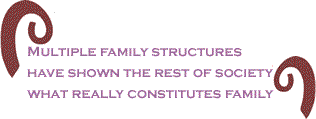
|
|||||||||||||||||||||||

Custom Search
|
|
 |
|
I have learned as both a pastor and also as a member belonging to several minority groups - African-American, women and lesbian - that a popular opinion on a civil rights issue does not always reflect the right choice. Too often the right choice and the moral high ground on an issue derive from small struggling groups trying both to be seen and heard among the cacophony of dissenting voices and opposing votes. And it is with these groups that we see democracy’s tenacity working, where those relegated to the fringes of society can begin to sample what those in society take for granted as their inalienable right like the right for all of its citizens to marry. Last week we saw democracy work with the election of Barack Obama as our country’s first African American president. My enslaved ancestors who built the White House could have never imagined that one of their progenies would one day occupy it. But we also saw last week, on the same day, how democracy didn’t work for its LGBTQ citizens with the passing of Proposition 8, an amendment to the California Constitution eliminating marriage equality for same-sex couples, after the California Supreme Court ruled in May that a “separate and unequal” system of domestic partnership for same-sex couples is not only blatantly discriminatory but it is also unconstitutional. While Seven out of ten of us pulled a lever to deny another minority groups their civil rights. And while the pollsters and pundits say that religion was our reason, as African American we have always discarded damning and damaging statements and scriptures about us in the name of religion like biblical passages that either cursed all people of African ancestry (The Curse of Ham, Genesis 9:18-27) or advocated slavery (Ephesians 6:5-8).
Therefore, multiple family structures presented by same-sex marriages should not pose a threat to the African-American community because they are what have sustained, saved and are still saving African-American families. A grandmother or an aunt and uncle - straight or gay - raising us in their loving home have anchored our families through the centuries. And these multiple family structures, which we have had to devise as a model of resistance and liberation, have always, by example, shown the rest of society what really constitutes family- its spiritual content and not is physical composition. Unfortunately, civil rights struggles in this country have primarily been understood, reported on and advocated within the context of African American struggles. The present-day contentious debate between black and queer communities, concerning what constitutes a legitimate civil rights issue and which group owns the right to use the term, is both fueled and ignored by systemic efforts by our government that deliberately pit both groups against each other rather than upholding the 13th and 14th Amendments to the U.S. Constitution that afford each of these marginal groups their inalienable rights. While it is true that the white LGBTQ community needs to work on its racism, white privilege, and single-issue platform that thwart all efforts for coalition building with both straight and queer communities of color, the African-American community needs to work on its homophobia. The blame of the passing of
Proposition 8 should not be placed on the
shoulders of blacks, Latinos or even religion, but rather the blame
should rightly be placed on the shoulders of our government. BlackCommentator.com
Editorial Board member, the Rev. Irene Monroe, is a religion columnist,
theologian, and public speaker. A native of Brooklyn, Rev. Monroe
is a graduate from Wellesley College and Union Theological Seminary
at Columbia University, and served as a pastor at an African-American
church before coming to Harvard Divinity School for her doctorate
as a Ford Fellow. Reverend Monroe is the author of Let Your Light Shine Like a Rainbow Always: Meditations on Bible
Prayers for Not-So-Everyday Moments |
|
Any BlackCommentator.com article may be re-printed so long as it is re-printed in its entirety and full credit given to the author and www.BlackCommentator.com. If the re-print is on the Internet we additionally request a link back to the original piece on our Website. Your comments are always welcome. eMail re-print notice
If you send us an eMail message we may publish all or part of it, unless you tell us it is not for publication. You may also request that we withhold your name. Thank you very much for your readership. |
|
| |
|
| Novmber 13, 2008 Issue 299 |
|
| Executive Editor: Bill Fletcher, Jr. |
| Managing Editor: Nancy Littlefield |
| Publisher: Peter Gamble |
| Est. April 5, 2002 |
Printer Friendly Version
in resizeable plain
text format or pdf
format. |
| Frequently Asked Questions |
 |

|
 |
 |
 |
| |
| |































 Many
Proposition 8 supporters voted yes believing the future traditional
family was at stake. But when society narrowly defines marriage
as solely the union between a man and a woman, it ignores the constantly
changing configuration of today’s family units. And the African
American community knows this best. While African American ministers
will argue for the traditional nuclear family, the stresses and
strains of racism has and continues to thwart the possibility. So
we created our own family structures.
Many
Proposition 8 supporters voted yes believing the future traditional
family was at stake. But when society narrowly defines marriage
as solely the union between a man and a woman, it ignores the constantly
changing configuration of today’s family units. And the African
American community knows this best. While African American ministers
will argue for the traditional nuclear family, the stresses and
strains of racism has and continues to thwart the possibility. So
we created our own family structures.






